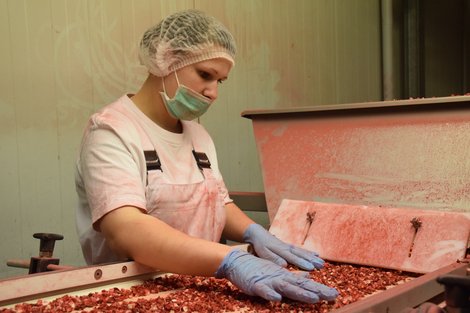Freeze-dried fruits from Germany for the whole world

Paradiesfrucht from Saxony-Anhalt produces the fruity ingredients for muesli, tea and chocolate worldwide
It is almost silent in the room where fresh fruit becomes dried fruit. Every now and then there is a loud clicking noise. The huge tunnel in which that happens is reminiscent of recumbent milk tanks in a dairy. Fruits are freeze-dried in the tunnel. The process of sublimation, in which the ice in the frozen fruits evaporates, takes ten to fourteen hours – at minus 18 degrees and in a vacuum. Freeze-dried fruits, which are non-perishable for two to three years and retain their full taste, are what remain.
Production manager Thomas Grothe crosses the tunnel room with long steps. In the next hall, employees in cotton wool jacks push trolleys full with sheets of dried fruits. It smells of raspberries and bilberries. Fruits such as apple or physalis, strawberries or pineapples are processed here. About 2,000 barrels leave the company every year: this is about 14,000 tonnes of wet fruits. But also fish, meat and herbs – anything that can be freeze-dried. Paradiesfrucht has already received several awards, most recently the Enterprise Award of the Association of East German Savings Banks (OSV).
Paradiesfrucht is on a course for growth. The production facilities at the company in the town of Salzwedel in the north of Saxony-Anhalt have been working to capacity for years. Business is booming. “There are not many companies which serve this market”, says managing director Bernd Wiesner. “You need capital and know-how.” The process is technically demanding. This must be imagined as if you are hanging out laundry in the winter. At first the fruits freeze stiff, and then they still eventually dry, says Bernd Wiesner in comparing freeze-dried fruit and frozen laundry.
The company offers a total package. The concept not only encompasses processing and sales, but also services for customers which are exclusively business clients. This includes all well-known major manufacturers of cereals, tea and chocolate products. The procurement managers in Salzwedel know when their clients need supplies again. Then they offer them new deliveries.
Freeze-dried fruits from Saxony-Anhalt are found in muesli mixtures or in tea just as well as in chocolate. “Chocolate manufacturers can no longer do without us”, reveals Bernd Wiesner. Pieces of fruit from Paradiesfrucht are found in the products of all major manufacturers. “But we also develop our own crunchy products, such as small cubes or small plates of fruit for the market in the USA.”
Paradiesfrucht originally derived from the business with fruit concentrates. This business is a market with fierce competition, says Bernd Wiesner. The enterprise in Lower Saxony managed by the Jahncke family sold the concentrate business in 2007 and focussed on freeze-drying. It is long since known that this was the right decision.
Paradiesfrucht opted for the Saxony-Anhalt location in 2004 because here there were subsidies, well-trained workers and the prospect of motorway access. And ultimately the proximity to Lower Saxony was a decisive factor. Paradiesfrucht received plenty of support from the city and the administrative district during the settlement process.
The company started with 24 employees; in the meantime there are 180 employees. Paradiesfrucht intends to grow more by the end of the year. The plant was originally conceived for one-fifth of current production. And this is to be expanded even more, because the appetite of clients for products from Paradiesfrucht is large. So production capacity had to be added this year.
More than half of all “paradise fruits” are exported. “All over the world”, summarises Bernd Wiesner, adding “to the USA, Australia, Asia and South Africa as well as throughout Europe. We have our own offices in China, Kiev, Manchester, Boston, San Francisco and Moscow.”
Visit Saxony-Anhalt at Food Matters Live in London at Stand 145 - in the German Pavilion.
